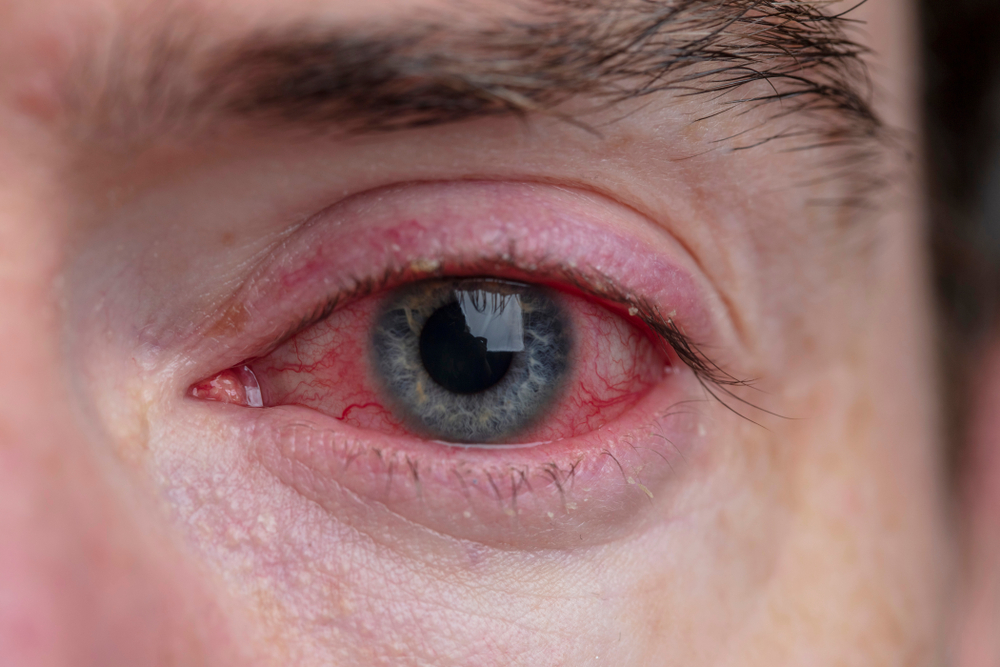
Eye infections can range from mild irritations to severe conditions that can impact vision. Recognizing the signs of a serious eye infection is essential for protecting your vision and ensuring prompt treatment.
What is an Eye Infection?
An eye infection occurs when harmful microorganisms, such as bacteria, viruses, or fungi, invade and multiply in or around the eye. Eye infections can affect different parts of the eye, such as the conjunctiva (the membrane covering the white part of the eye and inner eyelid), the cornea (the transparent layer covering the iris and pupil), or deeper structures inside the eye. The severity of an eye infection can range from mild irritation to a serious condition that requires immediate medical attention to prevent vision loss. Let’s go over the symptoms you should never ignore and what to do if you suspect an infection.
Severe Redness or Swelling
While minor redness or puffiness is often a sign of tired or dry eyes, significant or worsening redness and swelling could indicate a serious infection, like conjunctivitis (pink eye) or uveitis. Severe redness that spreads around the entire eye or comes with other symptoms like pain, discharge, or sensitivity to light should be addressed immediately.
Persistent or Sharp Eye Pain
Eye pain is never normal, and any sharp, stabbing, or persistent pain can be a sign of infection. Conditions such as keratitis (an infection of the cornea) or scleritis (inflammation of the white part of the eye) often cause severe pain that requires professional treatment. If you experience ongoing pain, don’t wait – reach out to your eye care provider.
Blurred or Distorted Vision
Vision changes, like blurriness or seeing halos, can be indicative of keratitis or even corneal ulcers, especially if they come on suddenly. Serious infections can cause inflammation or clouding that interferes with clear vision and, if untreated, may lead to permanent vision damage.
Thick Discharge or Watery Eyes
Eye discharge is common with infections, and the type of discharge can provide clues about the infection type. Yellow or green pus-like discharge may indicate bacterial infections, while clear, watery discharge often points to viral infections. However, excessive discharge of any kind is worth having evaluated.
Increased Sensitivity to Light
Light sensitivity, or photophobia, is a common symptom in eye infections affecting deeper layers, like uveitis or keratitis. This discomfort can make it challenging to keep your eyes open or be in bright environments. Sensitivity to light that doesn’t improve with rest should be promptly evaluated by an eye care specialist.
Itching, Burning, or Gritty Sensation
While mild itching can occur with dry eyes, intense itching or a feeling of sand in the eyes is often a sign of conjunctivitis or other surface infections. If these sensations persist or worsen, they could indicate a more serious condition that requires medical attention.
Foreign Body Sensation
If you feel as if something is in your eye, but you cannot remove it with blinking or rinsing, it might be due to an infection. Some conditions, like corneal ulcers, can create this sensation even though nothing is physically in the eye. This feeling should not be ignored, as it can lead to worsening symptoms if untreated.
When to Seek Help
If you experience any of the symptoms above, it’s crucial to seek help promptly. Eye infections, especially serious ones, require timely treatment to prevent complications. Here’s what to do:
Schedule an Appointment – Contact Eye Care Center of North Jersey to make an appointment as soon as symptoms appear.
Avoid Contact Lenses – If you wear contact lenses, remove them at the first sign of an infection. Continuing to wear them can worsen the infection.
Don’t Self-Medicate – Avoid using over-the-counter eye drops without a diagnosis, as some types can worsen certain infections.
Get in Touch with Eye Care Center of North Jersey Today
At Eye Care Center of North Jersey, we specialize in diagnosing and treating a variety of eye infections. With state-of-the-art diagnostic tools and compassionate care, we’re here to help protect your eyes and preserve your vision.
If you’re experiencing concerning symptoms of an eye infection, schedule an appointment with Eye Care Center of North Jersey for personalized treatment. Visit our office in Scotch Plains, New Jersey, or call (908) 322-8040 to book an appointment today.


